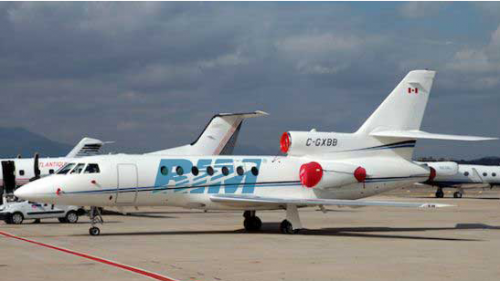Of late Research In Motion Ltd. (RIM) has been creating headlines for unsavory reasons and this time around it’s no different. RIM, reeling under a heavy blow presented to it in the form of its disastrous 1st quarter results, is on a cost cutting spree and has offered one of its two business jets for sale. This move is on the heels of the recent removal of 5000 of its employees from its rolls for the same cause.
Highlights of Contents
High-Flying Days Coming to an End
Cost escalation and under performance has put RIM under severe pressure from its shareholders. Shareholders’ unrest is justified given the steep descent in RIM’s market share. In the year 2007 the market share was 10.90%. By the end of 2008 the market share rose to 19.5% and during the first quarter of the following year RIM had its highest at 20.10%. Since then it saw a diminishing trend in its share of the smartphone market which now stands at an alarming 6.7%.
The only positive element is the consistency in sales but that hasn’t come to RIM’s rescue as Google and Apple have captured a major chunk of the smartphone market and their sales have outnumbered RIM’s. A loss of $518 million in the first quarter, revenue of $2.8 billion against the targeted $3.1 billion and, as if these weren’t enough, the much-delayed BlackBerry 10 which is not expected to see the light of day until 2013. All these have negatively contributed to RIM’s popularity which now trails behind HTC.

The Way Forward
The obvious measure to counter such a situation, and that too when it’s too late to act, is to cut costs as a way to boost efficiency. During its heydays, RIM had bought two business jets — the 9-seater Dassault SA F50EX and the 14-seater F900EX. These jets were used by RIM’s top executives for business trips since it has offices in 27 countries and operating in more than 175 markets and commercial flights would’ve been expensive. The flying machine up for sale is the SA F50EX, the smallest of the two, which is expected to ring in $6.5 millions. Avoiding the aircraft will help RIM to save $2.1 million a year as the jet’s annual operating costs.
RIM is optimistic that reduction in its headcount and selling of high value assets can bring about better efficiencies and bring down operating costs. But, to turn the company around, isn’t this strategy a bit outdated for a high-end technology company and that too an erstwhile market leader? There have been industry talks about few options RIM can adopt. One is to get itself sold to a market competitor; second is to get itself acquired by someone who’s seriously planning to make the plunge into the smartphone space; and third is to get itself split into messaging business unit and handset business unit.
The above are critical decisions that would require a lot of deliberation and ultimately the shareholders’ approval. Hence it’s important to garner their support and take them into confidence. RIM might now do the following:
– Forge strategic partnerships whereby it can join hands with companies that can revive certain of its grey areas
– License its Software
– Throw open its network to others which can bring in revenues
– Improve its public image and go for an image makeover, as well as aggressive campaigning all around and a versatile PR wing
– Starting from the helm, RIM should create awareness that the company is undergoing a sea change in all the departments. – Performance would be rewarded and non-performance would be penalized.
– Employ a Super Performing Marketing Team
– Strong market intelligence division is imperative. It’s speculated that RIM didn’t give sufficient attention and turned deaf ears to what was going on around them. From being a market leader to nearly ‘nothing’ in a very short span has everything to do with the lack of responsiveness on the part of the key officials. Hence an alert team of analysts who can derive conclusions from the various changes or development in the industry is the need of the hour.
– RIM should stick to its target market, i.e. enterprise customers. Already having a strong foothold, RIM should be focusing to value-add and consolidate its position. There’s no point in competing with Google and iPhone as it’s an altogether different ballgame.
– Even if the release of BB10 is delayed, let it be. But RIM should make sure that when its released, it should be a match-winner. Because it’s learned that loyal RIM customers are ready to give RIM its last opportunity before moving to a new platform.
RIM has an imposing challenge of handling its shareholders and its customer base at the same time. Judiciously picking its options is the only way out. Meanwhile let’s hope the selling of its aircraft doesn’t turn out to be symbolic.
